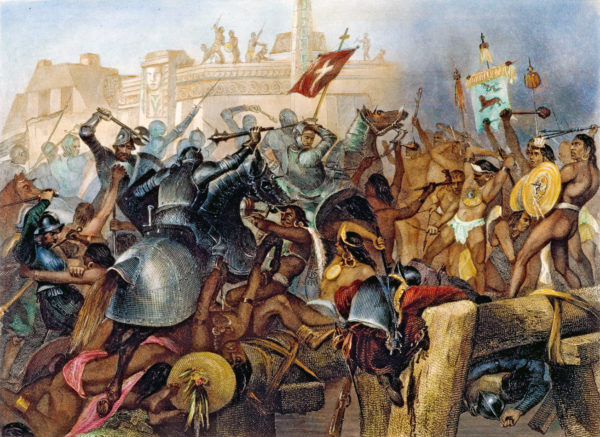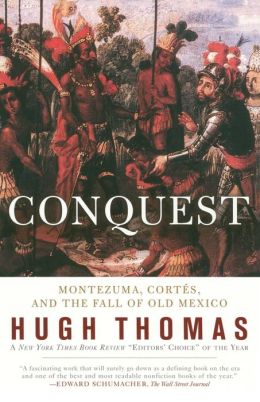
Conquest by Hugh Thomas is the history of the defeat of the Aztec Empire (hereafter called the Mexica) by Spanish Conquistadors under the command of Hernando Cortes in 1519 through 1521. It is the story of one empire ascending, the Spanish, and one at its peak and perhaps beginning its decline, the Mexica, whose gold and land in its fall fed the explosive growth of power in those who had subdued them.
The Mexica, led by Emperor Montezuma, held 125,000 square miles of land (more than 5 times the size of Pennsylvania), and had built a city, Tenochtitlan, that was home to over 150,000 people. The Conquistadors thought it the most beautiful city they had ever seen.
The Mexica gold and featherwork and their picture paintings were exquisite, their farming productive and sustainable, their ruling structure stable, their warrior’s reputation fearsome, their poetry superb.
However, they sacrificed human beings to the God of the Sun and their limbs were eaten by the powerful so that they could become more powerful. Sixty thousand skulls decorated racks in the central pyramid. The priests wore the skins of their victims and dyed their own skin black. When Cortes landed near present day Vera Cruz, Indian allies flocked to him. The Mexica were hated.
The Mexica had two additional weaknesses. They “had constructed their history on a myth of eventual cataclysm” (28). They believed their lives were always on the brink of disaster unless they made all the right choices for “nothing in Mexico was seen as happening by chance (180).” Their Gods were too numerous and capricious. Man always had to interpret the many signs they left and then had to choose just the right path of action. One bad choice could bring disaster. Second, they were led by Montezuma, a man who “considered flight, who considered hiding”, upon hearing of the invader’s horses’ “high as rooftops” and their dogs’ “blazing yellow eyes” and of their steel swords and lances, helmets, breastplates and of their cannon (180).
Then they had Cortes as their adversary, someone who “had that capacity of all successful men of being able to conceal his real intentions” (135). He had emerged from Medellin in Spain, a backwater dominated by “thefts, murders, illegal imprisonments, brawls, acts of menace and the improper occupation of lands” (121). He had received a further “education in brutality” in the Spanish conquest of Cuba (133) where he had learned that “absolute ruthlessness sometimes pays absolutely” (132). More than just a feral adventurer, he had a firm grounding in Latin and the Law. He was a gifted speaker, fearless but prudent, charismatic, deeply religious, a perfect man of his time and place who was convinced that his duty was to convert Indians to the one, true faith, a man supremely confident in the superiority of his Spanish heritage but also someone who desired gold, who in speaking to one of Montezuma’s diplomats, told him that “gold was good for a bad heart” and that “some of his men were ill with that complaint” (178).
 What followed was inevitable: misunderstanding, Spanish arrogance matched with Mexica indecisiveness, overreach and overreaction, threat, murder, massacre, Mexica resistance, destruction. The death of Montezuma, the Night of Sorrows when the Spanish retreated along a causeway, the terrible torch-lit battle that ensued, the siege of Tenochtitlan, its fall, the enslavement of the Mexica, their demographic collapse, 300 years of Spanish colonial rule.
What followed was inevitable: misunderstanding, Spanish arrogance matched with Mexica indecisiveness, overreach and overreaction, threat, murder, massacre, Mexica resistance, destruction. The death of Montezuma, the Night of Sorrows when the Spanish retreated along a causeway, the terrible torch-lit battle that ensued, the siege of Tenochtitlan, its fall, the enslavement of the Mexica, their demographic collapse, 300 years of Spanish colonial rule.
The experience of the Mexica (and later the Spanish and all other Empires) is “one reminder that any interpretation of human evolution based on the idea of unilinear progress forward is an illusion” (91).
Few histories better describe worlds this strange that existed close to us both geographically and in time. Thomas’s book is a great narrative and as such is filled with scenes of both beauty and horror that will stay with you.